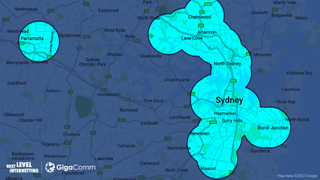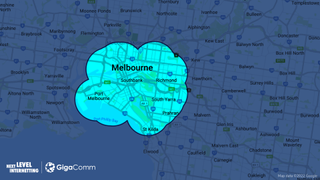Want real gigabit broadband? Ditch NBN and switch to GigaComm

If you’re an internet enthusiast in Australia in 2022, it’s not hard to get your heckles up. The thought of what might have been with a fibre-based infrastructure, the billions of dollars wasted remediating old copper (and laying new copper) across the country, performance that can vary wildly from premises to premises, advertised speeds not matching reality, repeated connection drop-outs and 60th place in global speed rankings – all married to the knowledge that toxic politics that got us here.
Keen to try GigaComm's premium service for yourself? Sign up before August 31, 2022 and you can score AU$20p/m off any plan for the first 6 months – a saving of AU$120!
Simply use the discount code SPECIAL20 to sign up here.
However, for residents in and around central Melbourne and Sydney, there’s now a viable alternative that outperforms Australia’s NBN network in all the important metrics. Say hello to GigaComm.
A relatively new face to Australia’s internet industry, GigaComm isn’t just another provider that resells NBN connections – like Optus, TPG or Telstra. It operates its own infrastructure that’s based on a combination of fibre and mmWave wireless technologies. That’s a techie way of saying it can offer much better performance, reliability and pricing than rivals.
Key GigaComm benefits
GigaComm offers consistently fast download speeds, including gigabit connections up to 1,000Mbps, plus upload speeds of up to 100Mbps. If, like many Australians, you’re relying upon video conferencing to an increasing degree (or suffer from high ping times in your favourite online games) you’ll be thrilled to know that GigaComm’s typical latency is just 2-4ms, which should all but banish the bane of lag!
For many Australians, GigaComm’s next benefit will be the critical one: direct tech support. Unlike with NBN providers, there’s no need to liaise with NBN Co when reporting a fault. Because GigaComm owns and operates its own network – from connection point to billing system – any failures can be more quickly identified and dealt with. This eliminates the significant stress and delay of being caught in the middle of an ‘NBN Co vs provider’ blame game.
Owning and operating its own infrastructure also means that costs can be considerably lower than rival providers too. By not having to embrace NBN Co’s nationally average wholesale prices (which are then passed on to the customer), GigaComm can set whatever price it chooses. And, it’s chosen to go cheaper – much cheaper.
How much are GigaComm internet plans?
GigaComm internet plans are available on both 24-month discounted contracts and on a no-lock-in, month-to-month basis.
Plans are priced the same regardless of whether or not you sign up to a contract:
- 200/50Mbps – AU$79p/m
- 400/50Mbps – AU$149p/m
- 1,000/50Mbps – AU$169p/m
Choosing the month-to-month option will incur an up-front AU$125 installation fee and the requirement to provide your own router – if you go with the contract option, that fee is waived and GigaComm will send you a new router. On both plan types, you get unlimited data as standard and you can also optionally double your upload speeds for just AU$20p/m extra.
It doesn’t take much research to establish that the performance and price this represents is dramatically cheaper than similar plans using the NBN infrastructure. With some plans, you can get double the speed for the same price – or less!
Finally, note that dedicated business internet plans (with Service Level Agreements and prioritised support) are also offered, as are telephony services.
Where is GigaComm available?
Being a relatively new provider, GigaComm internet is currently rolling out to selected areas of central Sydney and Melbourne.
You can check the heatmaps below to see if you're in the current coverage area (accurate as at July 2022), and then enter your address here to check full availability – or if you're not in a coverage area, to get notified if and when the service does open up to your suburb.
See the appendix at the bottom of this article for a full list of Sydney and Melbourne suburbs where the service is rolling out.
Sydney availability

Melbourne availability

Top 10 reasons you need Gigacomm gigabit internet
1. Working more productively.
The best technology is invisible: it’s a tool to get something else done. It fails when it presents a barrier to productivity. This may involve cloud-based office applications, sharing and syncing large files, or video conferencing with colleagues. Without a fast and reliable internet connection, at best you’ll be distracted – and at worst you’ll be unable to perform a critical task. Having internet that ‘just works’ alleviates this.
2. Connecting multiple devices concurrently.
According to Statista.com, the average number of internet-connected devices in an Australian home in 2019 was 18.1. This figure is expected to almost double to 35.6 devices by 2024 – and that’s joined by a significant jump in bandwidth requirements. Whether you’re consoling young kids because their streaming service is stuttering, arguing with flatmates over who’s hogging shared bandwidth, or wondering why all your connected devices have stopped functioning after you started streaming on your new 4K smart TV, remember that domestic bandwidth demands will continue to increase.
3. Streaming without buffering and drop-outs.
Australians are among the world’s highest adopters of large UHD 4K TVs. When you combine this with the explosion of streaming video content, spread across multiplying streaming services – and the accelerating quality enhancements to video and audio that comes with them – it becomes evident that you need fast and reliable internet just to watch TV nowadays.
4. Superior gaming experiences.
It’s a simple fact: out of two equally-talented online gamers, the one with the lowest-latency internet will have an edge – and win more often.
5. Content creation, curation and sharing.
It used to be design professionals (and their large multimedia files) that needed fast internet and bandwidth the most. However, explosions in video content creation across major social media platforms like TikTok, Facebook, Instagram and YouTube now make them a necessity for all content creators.
6. Staying in touch with friends and family.
Nowadays, even the most Luddite members of your social circle can easily make hi-res video calls from their smartphone. On the one hand, this means its never been easier to keep in touch with loved ones and address isolation issues. On the other, the reliance upon bomb-proof internet to achieve this has never been greater.
7. Easy access to online services and professional tools.
Whether you’re utilising Microsoft Office in a web browser, editing video in the cloud or dealing with massive game updates, the web’s tolerance for delays has collapsed. More complex web apps mean you now need speed and reliability to meet basic, functional expectations.
8. Multiple screens, multiple uses (without the trade-offs).
Both wired and mobile devices are supporting higher-and-higher resolutions, leading to an increased demand for UHD content. Add to this the modern norm for household members to watch (at least) two screens simultaneously, and you’ve got an environment that needs an increasing amount of networking headroom, in terms of both speed and bandwidth, just to operate smoothly.
9. Protecting your memories and managing your digital records.
People who haven’t lost data simply haven’t lost data yet. Everyone needs offsite backup for proper protection, and only superfast internet upload speeds will allow this without impacting your regular internet usage.
10. Smarter homes for better living.
The technologies behind smart home devices are becoming increasingly accessible, secure and useful. Whether it’s Amazon Alexa adjusting the lighting, adding a video doorbell for security, or using IoT medical sensors to monitor a poorly relative, these devices all need a stable, reliable internet connection just to function.
With so many good reasons to choose GigaComm internet, it’s actually hard to find reasons NOT to make the switch!
Even so, GigaComm is offering an additional sweetener: sign-up before August 31, 2022 and you’ll receive AU$20p/m off any plan for the first 6 months!
Just use the special code: SPECIAL20 and sign up here.
List of NSW and Vic suburbs where GigaComm is currently rolling out
New South Wales
| Postcode | Suburb |
|---|---|
| 2000 | Sydney |
| 2000 | Haymarket |
| 2009 | Pyrmont |
| 2010 | Darlinghurst |
| 2010 | Surry Hills |
| 2011 | Elizabeth Bay |
| 2015 | Alexandria |
| 2015 | Eveleigh |
| 2016 | Redfern |
| 2016 | Redfern |
| 2017 | Waterloo |
| 2018 | Roseberry |
| 2020 | Mascot |
| 2021 | Centennial Park |
| 2022 | Bondi Junction |
| 2038 | Annandale |
| 2039 | Rozelle |
| 2043 | Erskineville |
| 2047 | Drummoyne |
| 2060 | McMahons Point |
| 2061 | Kirribilli |
| 2061 | Milsons Point |
| 2064 | Artarmon |
| 2065 | St Leonards |
| 2065 | Crows Nest |
| 2065 | Wollstonecraft |
| 2067 | Chatswood |
| 2093 | Balgowlah |
| 2093 | Manly Vale |
| 2095 | Manly |
| 2127 | Sydney Olympic Park |
| 2128 | Silverwater |
| 2130 | Summer Hill |
| 2131 | Ashfield |
| 2134 | Burwood |
| 2137 | Breakfast Point |
| 2137 | Cabarita |
| 2137 | Concord |
| 2138 | Rhodes |
| 2140 | Homebush |
| 2140 | Homebush West |
| 2142 | Holroyd |
| 2150 | Parramatta |
| 2160 | Merrylands |
| 2204 | Marrickville |
| 2205 | Arncliffe |
Victoria
| Postcode | Suburb |
|---|---|
| 3000 | Melbourne |
| 3002 | East Melbourne |
| 3003 | West Melbourne |
| 3004 | Melbourne |
| 3006 | Southbank |
| 3008 | Docklands |
| 3011 | Footscray |
| 3031 | Flemington |
| 3031 | Kensington |
| 3032 | Ascote Vale |
| 3039 | Moonee Ponds |
| 3051 | North Melbourne |
| 3053 | Carlton |
| 3066 | Collingwood |
| 3067 | Abbotsford |
| 3121 | Cremorne |
| 3121 | Richmond |
| 3122 | Hawthorn |
| 3123 | Hawthorn East |
| 3124 | Camberwell |
| 3141 | South Yarra |
| 3142 | Toorak |
| 3143 | Armadale |
| 3144 | Malvern |
| 3149 | Mount Waverley |
| 3161 | Caufield North |
| 3162 | Caufield |
| 3168 | Notting Hill |
| 3181 | Prahran |
| 3181 | Windsor |
| 3182 | St Kilda |
| 3205 | South Melbourne |
| 3207 | Port Melbourne |
Sign up to get the BEST of Tom's Guide direct to your inbox.
Get instant access to breaking news, the hottest reviews, great deals and helpful tips.
